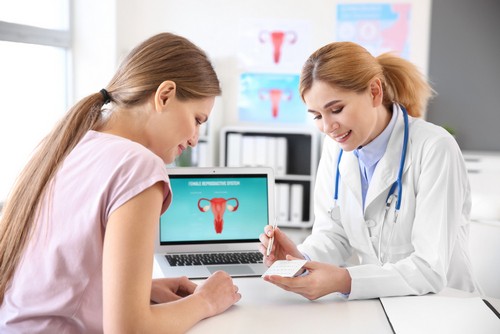According to the definition of the American College of Obstetricians and Gynecologists, emergency contraception is any way to prevent pregnancy after unprotected intercourse.
WHO experts believe that emergency contraceptives are safe for health.
As a rule, emergency contraception methods are not harmful to health. Although some methods have contraindications, they are usually associated with some kind of severe reaction to the components of the drug in the past.
In ordinary life, a healthy woman does not need to undergo a thorough examination in order to resort to emergency contraception.
At the same time, contraceptives are effective medications. This means that they may have side effects .

Unprotected can be considered sex, in which :
- contraceptives were not used – condoms, drugs and intrauterine devices;
- a condom torn, jumped off, or used an unsuitable size;
- the woman forgot about contraceptives – she was late to take the pill, did not give an injection, did not use a ring or patch;
- spermicidal tablet or film is not completely dissolved;
- the cervical (uterine) cap has shifted, the diaphragm has broken or the intrauterine device has fallen out;
- there was an error in the calculations with the calendar method of contraception (the essence of the method is in observing the menstrual cycle and refusing sex during ovulation. The method is not very effective – in couples who regularly use the calendar method, 24 out of 100 women become pregnant );
- failed to interrupt intercourse in time (even with an impeccably completed maneuver, the reliability of this method leaves much to be desired – in couples who practice interrupted intercourse, 28 out of 100 women become pregnant ).
According to WHO, emergency contraception avoids pregnancy in 95% of unprotected sex. Although this is not a guarantee of peace, the effectiveness of the method is still five times higher than that of an interrupted intercourse or calendar method.
4 important facts about emergency contraception
- Emergency contraceptive methods can be used even by those women who have contraindications to the use of everyday contraceptives.
- Pills for emergency contraception can be taken several times during one menstrual cycle . But it is important to understand that as a means of long-term protection, they are not as effective as everyday contraceptives.
- Although pills for emergency contraception are called “morning”, they can be used at any time after sex.
- Emergency contraceptives do not protect against genital infections.
Why after unprotected sex you need to see a doctor
There are a number of reasons why you need to make an appointment with a gynecologist after unprotected sex (and it is not only a matter of choosing the method of emergency contraception).
The doctor will help you choose the general line of contraception. It largely depends on the woman’s lifestyle. Indeed, there is a very big difference between regular sex with a husband, when a woman just forgets to drink contraceptives, and contacts with several partners in a month.
The clinic can also be examined for genital infections. After accidental contact, women are much more worried about contraception than the need to be checked for sexually transmitted diseases. Moreover, the consequences of past illnesses can be very serious.
A visit to the doctor allows you to get true safety – both in terms of contraception and in terms of health.
What are the methods of emergency contraception?
The World Health Organization ( WHO ) and the American College of Obstetricians and Gynecologists ( ACOG ) recommend four methods for emergency contraception. In Russia, only three of them are used (tablets with ulipristal are not registered in our country). Let’s figure out what is the difference between these methods and in which cases you should resort to them.
1. Copper uterine spiral
Level of effectiveness. One of the most reliable methods of emergency contraception is that fewer than 1 out of 100 women are at risk of becoming pregnant .
What is it and how it works. The fallopian spiral is a plastic device in the form of the letter “T”, on a long leg of which a copper wire is wound. Copper slows the movement of sperm, reducing the chance of fertilization. But even if fertilization takes place, copper will not allow the embryo to gain a foothold on the inner lining of the uterus.
How to use. The spiral should be set by the doctor. This must be done within five days after sex – in this case, the probability of avoiding conception is the highest. In some studies, the spiral worked 10 days later, but just in case, it is better not to risk it.
“Spirals are not only with copper, but also with hormonal components. They are suitable for women who regularly have to think about emergency contraception: for example, married women and those who have a regular partner. This is a reliable, “long-playing” and highly effective method, ”adds Tatyana Rumyantseva.
2. Tablets with ulipristal
Level of effectiveness. The second most reliable way that Western leaders recommend is less than 1 out of 100 women who become pregnant .
What is it and how it works. Non-hormonal pills that prevent the egg from escaping from the ovary.
How to use. Drink one tablet for a maximum of five days after sex. The sooner you manage to take the medicine, the higher the effectiveness.
“Ulipristal in our country is not registered as an emergency contraceptive, therefore we should not consider it as a drug of choice,” Tatyana Rumyantseva clarifies.
3. Tablets with levonorgestrel
Level of effectiveness. 1 out of 100 women is at risk of becoming pregnant .
What is it and how it works. Hormonal pills that delay the development of the egg – this helps to avoid fertilization if sex happened before ovulation and during it, when the chance of getting pregnant is the highest.
How to use. Drink the medicine within three days after sex, but the sooner the better. Ideally, you need to use the drug during the day . “Levonorgestrel tablets are considered the most effective in the first three days after unprotected intercourse,” explains Tatyana Rumyantseva.
4. Tablets with mifepristone
Level of effectiveness. 1 out of 100 women is at risk of becoming pregnant .
What is it and how it works. Hormonal pills, the principle of action of which depends on the phase of the cycle. The medicine either delays ovulation or “expels” the embryo from the inner lining of the uterus. Mifepristone tablets are considered one of the most reliable, but they have the most contraindications.
How to use. Drink the medicine within five days after sex .
“Mifepristone is considered slightly less effective than levonorgestrel, but it remains effective for five days. If more than three days have passed since unprotected sex, you need to think about using this particular drug, ”says Tatyana Rumyantseva.
In some cases, the doctor may prescribe combined oral contraceptives, but this method of emergency contraception is considered the least reliable : 2 out of 100 women risk becoming pregnant .
If sex has already happened, and there is no time to go to the doctor, you should immediately put to use the drug for emergency contraception, which is available at the nearest pharmacy.

After this, you should still plan a visit to the doctor. This will help to find out if you have additional risks and if you need additional examination after unprotected sexual intercourse.
The most common side effects:
- headache – in 19% of women;
- a delay in menstruation for a week or bleeding not associated with menstruation – in 16% of women;
- nausea – in 12% of women;
- soreness of the mammary glands, abdominal pain, dizziness and fatigue are very rare.
In most cases, after taking the tablets, the side effects go away on their own, they do not need to be treated.
Myths about emergency contraception
Myth No. 1: Emergency contraception is contraindicated in adolescents.
This is not so . Doctors around the world believe that premature pregnancy or abortion is much more dangerous to health than emergency contraception. In addition, to get the pills, the teenager will have to see a doctor – and this further reduces the risk and reduces the risk of contracting sexually transmitted infections.
Myth # 2: Emergency contraception harms unborn children
This is not true. None of the studies revealed a risk for children who appeared in women after stopping contraceptives.
Myth # 3: Emergency contraception increases your risk of infertility
No emergency contraceptive increases the risk of infertility in the future.
Myth No. 4: If you drink an emergency contraceptive, not knowing about pregnancy, the baby will be born a freak
Abortion can only be caused by mifepristone tablets. All other emergency contraceptives do not affect the pregnancy and development of the child.
Myth # 5: Emergency contraception increases the risk of an ectopic pregnancy in the future.
Everything is exactly the opposite: any contraceptives reduce this risk, because in principle they reduce the chances of getting pregnant.
Myth # 6: Emergency contraception provokes cancer
The uterine spiral does not provoke cancer – it is unequivocally proven . As for birth control pills, there is debate. Most likely, even if there is a risk, it is extremely small .
Three main questions about emergency contraception
1. How to make sure emergency contraception helps?
– The most reliable way is to wait for the onset of menstruation . Another way is to take a blood test for chorionic hormone (hCG). This analysis confirms the onset of pregnancy, but it makes sense to take it no earlier than 7-10 days after unprotected contact. Ideally, the analysis should be carried out from the first day of delayed menstruation.
It is important to understand that the absence of high levels of hCG in the blood is not a reason to calm down, because in some women the concentration of the hormone rises more slowly. In this situation, it remains only to wait for menstruation. If the level of hCG is high, this is a clear signal that conception has occurred.
2. Is it worth it to pre-stock funds for emergency contraception, so that then you do not run to the doctor?
This is a very bad practice. If you know that you will have sex, you need to purchase means for normal contraception in advance: condoms, pills or a spiral. Timely contraception is preferable to emergency.
3. What is the best way of protection?
The most reliable contraceptive tactic is to use products that remain in the woman’s body for a long time: for example, spirals or implants. But if a woman has several partners, then she still can’t get away from condoms, even if she uses some kind of “long-playing” method of contraception. This reduces the risk of contracting sexually transmitted infections.
IMPORTANT! This material is not an advertisement for any medicine. Before using the medication, consult a specialist.



